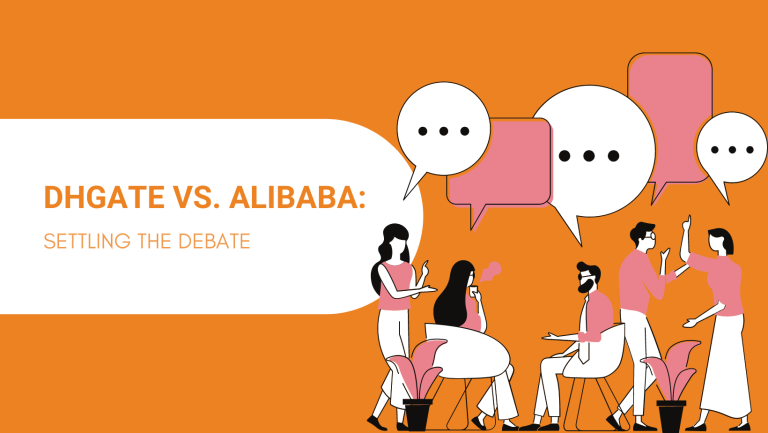Choosing the right wholesale platform can make or break your eCommerce business. If you’re looking to source products from China, you’ve likely come across DHgate and Alibaba. But which one is the better choice for you?
Both DHgate and Alibaba offer vast product catalogs, competitive pricing, and access to Chinese manufacturers, but they cater to different types of buyers and have distinct strengths.
DHgate specializes in smaller orders and is often preferred by individual buyers or small businesses. Alibaba, on the other hand, is geared towards larger wholesale purchases and provides more options for customization.
Your decision will depend on factors like order size, product type, and your specific business needs. Let’s dive into the key differences between these two giants of Chinese eCommerce to help you make an informed choice.
Key Takeaways
- DHgate suits smaller orders while Alibaba caters to larger wholesale purchases.
- Product quality and supplier verification processes differ between the platforms.
- Consider factors like minimum order quantities, shipping options, and payment security when choosing.
What Is DHgate?
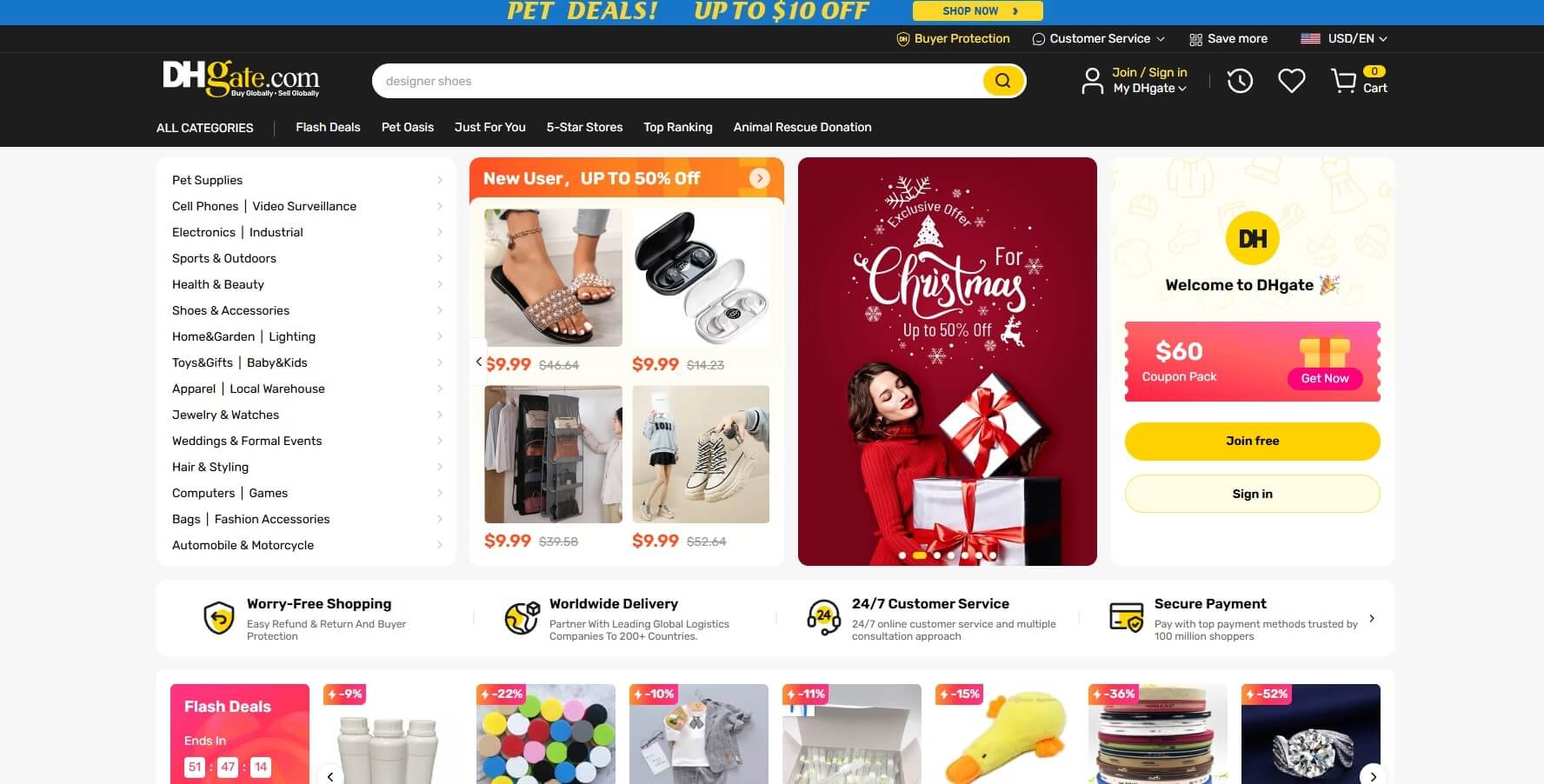
DHgate is a popular online marketplace that connects buyers with Chinese suppliers. Founded in 2004 by Diane Wang, it has grown into a major player in the e-commerce industry.
You’ll find DHgate primarily caters to small and medium-sized businesses looking to source products from China. It offers a wide range of items, from electronics to fashion accessories.
DHgate’s platform allows you to browse millions of products from thousands of verified suppliers. You can place orders for small quantities, making it ideal for dropshippers and retailers testing new products.
The company has seen significant growth over the years. By 2023, DHgate had over 32 million registered buyers from more than 220 countries and regions.
One of DHgate’s key features is its buyer protection program, which includes:
- Secure payment options
- Refund guarantees
- Dispute resolution services
You’ll also find helpful tools on DHgate, such as:
- Real-time order tracking
- Detailed seller ratings and reviews
- Multi-language customer support
DHgate aims to make international trade accessible to businesses of all sizes. Its user-friendly interface and low minimum order quantities have made it a go-to platform for many e-commerce entrepreneurs.
Pros and Cons of DHgate
DHgate offers unique advantages and challenges for online buyers and sellers. Understanding these can help you make informed decisions when using the platform.
Pros
- Lower minimum order quantities (MOQs): DHgate allows you to purchase smaller quantities, making it ideal for testing new products or starting a small business. You can often buy as few as 1-5 items instead of hundreds.
- Wide product variety: The platform offers millions of products across numerous categories. You’ll find everything from electronics to clothing to home goods, giving you ample options to explore.
- Buyer protection: DHgate provides safeguards like escrow services and refund policies. This helps protect your purchases and gives you peace of mind when ordering from unfamiliar sellers.
- User-friendly interface: The website is easy to navigate, making it simple for newcomers to find and purchase products quickly.
Cons
- Product quality concerns: Some items on DHgate may not meet expected quality standards. It’s crucial to carefully read product descriptions and reviews before purchasing.
- Slower shipping times: Many DHgate sellers ship directly from China, which can lead to longer delivery times compared to domestic options. Expect wait times of 2-4 weeks for most orders.
- Limited customer support: DHgate’s customer service may not be as robust as larger platforms. You might face challenges when resolving disputes or getting timely assistance.
- Potential for counterfeit goods: While DHgate works to prevent it, some sellers may list fake branded items. Be cautious when purchasing luxury or name-brand products.
What Is Alibaba?
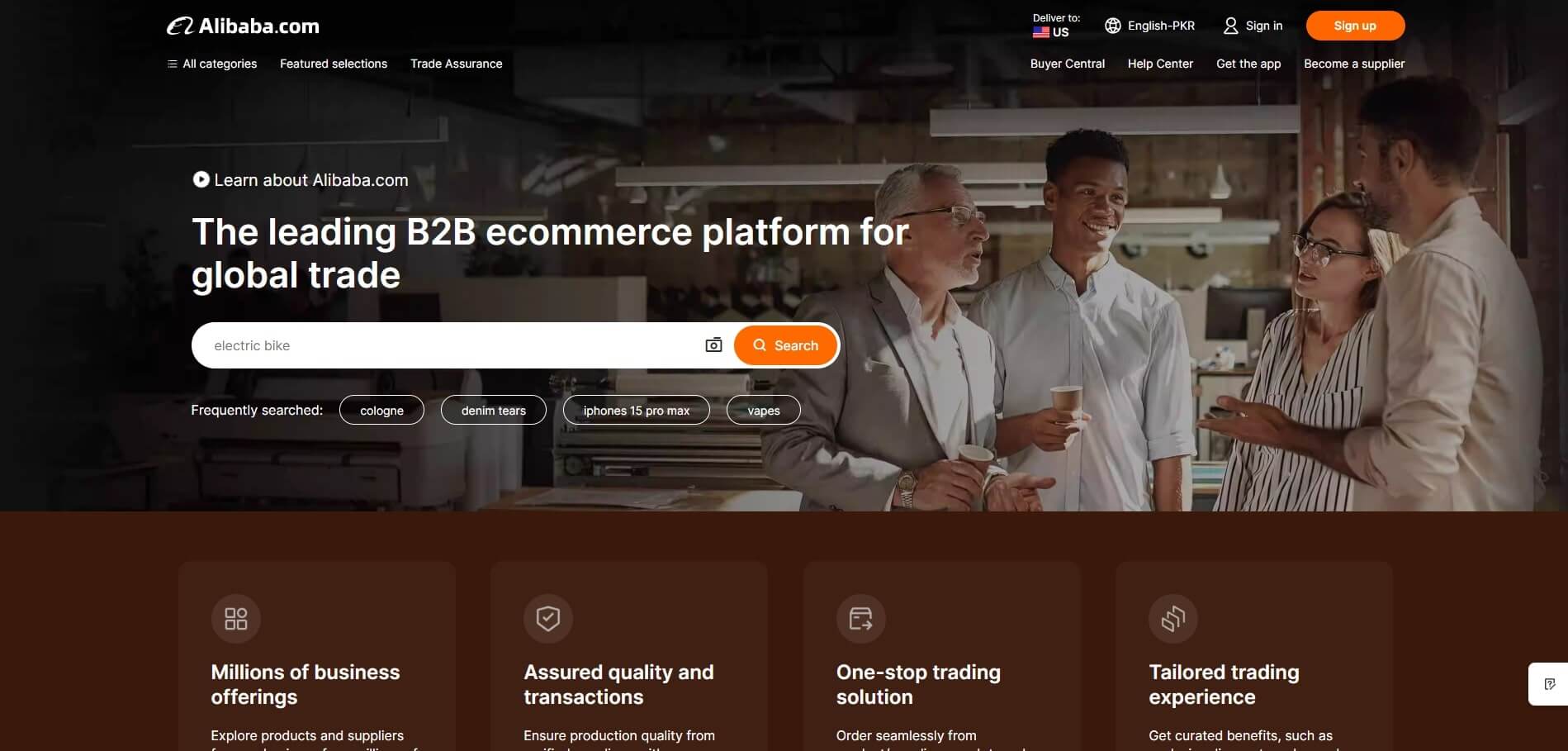
Alibaba is a giant in the world of B2B eCommerce. Founded in 1999 by Jack Ma in Hangzhou, China, it has grown into a global powerhouse connecting businesses worldwide.
Alibaba is a vast online marketplace that caters primarily to wholesalers, manufacturers, and retailers looking to source products in bulk.
The platform boasts impressive numbers:
- Over 190 million active buyers
- More than 200,000 suppliers
- Products spanning 40+ major categories
When you use Alibaba, you’re tapping into a network that facilitates cross-border trade on a massive scale. It’s particularly popular for sourcing:
- Electronics
- Clothing and textiles
- Industrial equipment
- Raw materials
Alibaba offers various services to make your sourcing easier:
- Verified suppliers
- Trade Assurance protection
- Secure payment options
As a business owner, you’ll appreciate Alibaba’s focus on B2B transactions. It’s designed for those looking to purchase larger quantities, often with customization options.
Remember, Alibaba isn’t just a single website. It’s part of the larger Alibaba Group, which includes other popular platforms like AliExpress and Taobao.
Pros and Cons of Alibaba
Alibaba offers unique advantages and challenges for businesses sourcing products from China. Let’s explore the key benefits and drawbacks to help you decide if it’s the right platform for your needs.
Pros
- Vast supplier network: Alibaba connects you with over 200,000 suppliers, giving you access to an extensive range of products and manufacturing capabilities.
- Competitive bulk pricing: You can often secure lower prices for large orders, making it ideal for businesses looking to purchase in volume.
- Trade Assurance protection: This service safeguards your payments and ensures product quality, reducing risks in international trade.
- Verified suppliers: Alibaba’s strict vetting process helps you find reliable manufacturers, increasing your confidence in potential business partners.
- Customization options: Many suppliers offer product customization, allowing you to tailor items to your specific requirements.
Cons
- High minimum order quantities: Many suppliers set high MOQs, which can be challenging for small businesses or those testing new products.
- Complex navigation: The platform’s size and features can be overwhelming, especially for new users unfamiliar with B2B marketplaces.
- Communication barriers: Language differences may lead to misunderstandings with suppliers, potentially causing delays or errors in orders.
- Longer shipping times: Products often take weeks to arrive, which can be problematic if you need items quickly.
- Quality variability: Despite verification processes, product quality can still vary between suppliers, requiring careful vetting and sample orders.
DHgate vs Alibaba: Side-by-Side Comparison
1. User Experience

The user experience on DHgate and Alibaba differs significantly, affecting how buyers interact with each platform. These differences can impact your ability to find products, communicate with suppliers, and complete transactions efficiently.
DHgate
DHgate offers a user-friendly interface that’s easy to navigate, even for first-time users. You’ll find a clean layout with clear categories and a prominent search bar.
The platform’s search functionality is intuitive, allowing you to quickly find products using keywords or filters.
Product pages on DHgate are straightforward, displaying key information like prices, minimum order quantities, and shipping options upfront. You can easily compare different sellers and read customer reviews to make informed decisions.
DHgate’s mobile app mirrors the website’s simplicity, enabling you to shop on-the-go. The checkout process is streamlined, with multiple payment options and a clear display of total costs, including shipping fees.
Alibaba
Alibaba’s user experience is more complex due to its extensive features and B2B focus. You’ll encounter a dense homepage with numerous categories, features, and promotional sections.
This can be overwhelming for new users but provides depth for experienced buyers.
Alibaba’s search function is powerful, offering advanced filters to narrow down results by supplier type, product certifications, and more.
Product pages are information-rich, providing detailed specifications and customization options.
Alibaba’s platform includes additional tools like Trade Assurance and supplier verification, which add layers to the buying process. While these features enhance security, they can increase the learning curve for new users.
The mobile app offers most desktop functionalities but may feel cluttered on smaller screens. Overall, Alibaba’s user experience caters to serious B2B buyers who value comprehensive information and tools over simplicity.
2. Features and Payment Security

Both DHgate and Alibaba offer robust features and payment security measures to protect buyers and sellers. Each platform has unique offerings tailored to different types of transactions and business needs.
DHgate
DHgate provides several features to ensure a smooth buying experience for small-scale purchasers. You can benefit from their buyer protection program, which safeguards your orders and payments.
This program covers issues like non-delivery, quality discrepancies, and incorrect items.
DHgate offers various payment methods, including credit cards, PayPal, and wire transfers. The platform employs SSL encryption to secure your financial information during transactions.
For added security, DHgate uses an escrow service. This means your payment is held until you confirm receipt and satisfaction with your order. If issues arise, you can open a dispute within the protection period.
Alibaba
Alibaba caters to larger B2B transactions with its comprehensive Trade Assurance program. This program protects you if suppliers fail to meet agreed terms for product quality and delivery time.
Alibaba’s payment options include Alipay, credit cards, and telegraphic transfers. The platform’s secure payment system uses advanced encryption to protect your financial data.
For high-value orders, Alibaba offers an escrow service similar to DHgate’s. However, Alibaba’s service is designed to handle larger transaction amounts, making it suitable for bulk purchases and long-term supplier relationships.
Alibaba also provides verification services for suppliers, helping you identify trustworthy partners. This feature is particularly valuable when dealing with new vendors or large orders.
3. Product Variety and Pricing
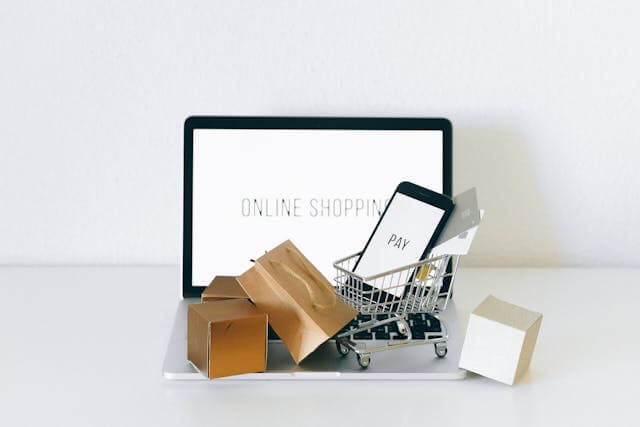
DHgate and Alibaba offer diverse product ranges with different pricing strategies. Your choice between these platforms depends on your specific needs and purchasing goals.
DHgate
DHgate specializes in cross-border trade and caters primarily to retail buyers. You’ll find a wide array of consumer goods, including electronics, clothing, accessories, and home decor. The platform is particularly strong in niche products and trending items.
DHgate’s pricing is generally competitive, with many items available at wholesale rates even for small quantities. You can often purchase single units or small batches, making it ideal for individual buyers or small businesses.
The average order value on DHgate is around $200-$300, reflecting its focus on smaller transactions. While prices are often low, shipping costs can vary significantly depending on the seller and your location.
Alibaba
Alibaba boasts an unparalleled product catalog, catering to virtually every industry imaginable. You’ll find everything from raw materials and industrial machinery to finished consumer goods. The platform excels in B2B transactions and bulk purchases.
Pricing on Alibaba is typically based on larger quantities. You’ll often see tiered pricing structures, with costs decreasing as order volumes increase. For example, a product might cost $10 per unit for 100 pieces, but drop to $8 per unit for 1000 pieces.
Alibaba’s strength lies in its competitive pricing for bulk orders. The platform’s average order value is significantly higher than DHgate’s, often ranging from $1000 to $5000 or more. This reflects its focus on larger B2B transactions and wholesale purchases.
4. Product Quality

Product quality is a crucial factor when choosing between DHgate and Alibaba. Both platforms offer a wide range of items, but their approaches to quality control and supplier management differ significantly.
DHgate
DHgate’s product quality can vary widely. You’ll find a mix of high-quality items and lower-grade products. About 30% of DHgate sellers are manufacturers, while the rest are resellers or wholesalers.
To ensure good quality on DHgate:
- Check seller ratings and reviews carefully.
- Look for Top Merchant badges.
- Request product samples before bulk orders.
- Use DHgate’s buyer protection program.
DHgate offers a dispute resolution process if you receive subpar items. However, be aware that some categories, like electronics and branded goods, may have a higher risk of counterfeits or low-quality products.
Alibaba
Alibaba generally offers higher product quality due to its focus on B2B transactions and stricter supplier vetting. The platform has over 150,000 verified suppliers, many of which are manufacturers.
To ensure quality on Alibaba:
- Look for Gold Suppliers and Trade Assurance badges
- Request product samples and factory audits
- Use Alibaba’s inspection services
Alibaba’s supplier verification process includes on-site checks and third-party assessments. This helps maintain a higher overall quality standard.
However, you should still exercise caution and thoroughly research suppliers, especially when dealing with large orders or custom manufacturing.
5. Types of Suppliers Available
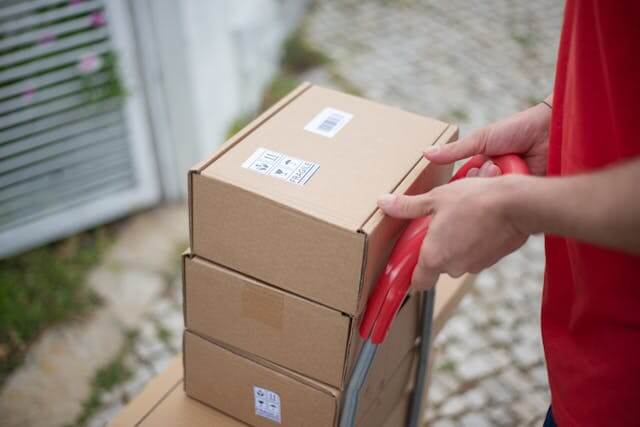
DHgate and Alibaba offer different types of suppliers to meet various business needs. Each platform caters to specific supplier categories, influencing product quality, pricing, and order quantities.
DHgate
DHgate primarily features smaller factories and wholesalers. Many suppliers offer ready-to-ship products in smaller quantities, which is ideal if you’re starting a small business or testing new products.
DHgate suppliers often specialize in consumer goods, electronics, and fashion items. Many are geared towards dropshipping and retail arbitrage. Compared to Alibaba, you can expect faster shipping times for small orders.
The platform has over 2.2 million suppliers, with about 30% being manufacturers. This diversity allows you to find unique products and competitive prices. However, you may need to vet suppliers carefully, as quality can vary.
Alibaba
On Alibaba, you’ll encounter a wider range of supplier types. These include large manufacturers, trading companies, and wholesalers. This variety gives you more options for sourcing products at different scales.
Alibaba boasts over 10 million active sellers, with a significant portion being manufacturers. You can find suppliers for almost any product category, from electronics to industrial equipment.
Many Alibaba suppliers offer customization options and are equipped for large-scale production. This makes the platform suitable for businesses looking to create private label products or place bulk orders.
Alibaba’s supplier verification process is generally more rigorous than DHgate’s. You’ll find Gold Suppliers and Trade Assurance programs that offer additional security for your transactions.
6. Sourcing Restrictions (MOQ)

Minimum order quantities (MOQs) play a crucial role when sourcing products from online marketplaces. They affect your purchasing strategy and the types of suppliers you can work with.
DHgate
DHgate offers more flexibility with lower MOQs. Many suppliers on the platform allow you to purchase single items or small quantities. This makes DHgate ideal for:
- Small businesses testing new products
- Individual buyers
- Dropshippers
You’ll find suppliers offering MOQs as low as 1-5 units for many products. Some tips for working with DHgate’s MOQs:
- Use filters to search for low MOQ suppliers.
- Message sellers to negotiate custom order quantities.
- Look for “mix and match” options to meet MOQs across product variants
DHgate’s lower MOQs come with slightly higher per-unit prices compared to bulk orders. However, this tradeoff allows you to start small and scale up as needed.
Alibaba
Alibaba caters to larger-scale sourcing with higher MOQs. Typical minimum orders range from 50-1000 units, depending on the product and supplier. This structure benefits:
- Established businesses
- Wholesale buyers
- Those looking for customized products
To work effectively with Alibaba’s MOQs:
- Negotiate with suppliers for lower quantities on initial orders.
- Consider grouping orders with other buyers to meet MOQs.
- Look for suppliers offering sample orders to test products before committing to large quantities.
Alibaba’s higher MOQs often result in better per-unit pricing, which can lead to significant savings when placing larger orders.
6. Shipping Methods
Choosing the right shipping method can significantly impact your e-commerce experience. Both DHgate and Alibaba offer various options to meet different needs and budgets.
DHgate
DHgate provides several shipping options to cater to diverse customer requirements. You can choose from standard, express, and economy shipping methods. Standard shipping typically takes 7-15 business days and offers a balance between cost and speed.
Express shipping is faster, usually delivering within 3-7 business days, but it is more expensive. Economy shipping is the most budget-friendly option, taking 15-30 days on average.
DHgate’s shipping reliability has improved over the years. Many customers report satisfaction with delivery times, especially for express options. However, economy shipping can sometimes face delays, particularly during peak seasons.
Alibaba
Alibaba offers a wider range of shipping services compared to DHgate. You can opt for direct shipping from manufacturers or use third-party logistics providers. Alibaba’s shipping options include sea freight, air freight, and express delivery.
Sea freight is cost-effective for large orders but takes longer (30-60 days). Air freight offers a balance of speed and cost, typically taking 7-15 days. Express delivery is the fastest option, usually within 3-7 days.
Alibaba’s shipping costs vary greatly depending on order size, supplier location, and destination. For international orders, Alibaba often provides more competitive rates than DHgate, especially for bulk purchases.
However, you may need to handle customs clearance for some shipping methods on Alibaba.
7. Returns/Exchange Policies
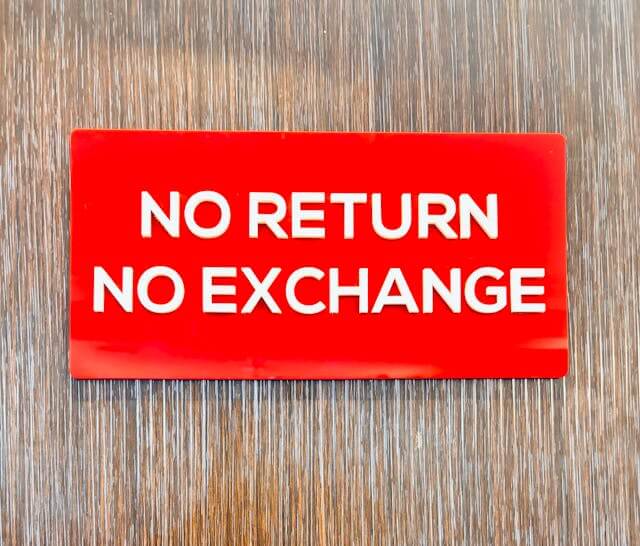
Return and exchange policies play a crucial role in your online shopping experience. Both DHgate and Alibaba have distinct approaches to handling returns and exchanges, which can significantly impact your purchasing decisions.
DHgate
DHgate offers free returns and exchanges under specific circumstances. If you don’t receive your order or the supplier fails to ship on time, you’re eligible for a full refund. This policy protects you from potential losses due to supplier errors.
For defective products, DHgate allows you to open a dispute within 3 days of delivery. You’ll need to provide clear photos or videos as evidence. The platform typically processes refunds within 3-5 business days after the dispute is resolved in your favor.
DHgate’s buyer protection covers you for 30 days after the estimated delivery date. This gives you ample time to inspect your items and initiate a return if necessary.
Alibaba
Alibaba’s return policy is more supplier-dependent, which means it can vary based on the individual seller. The platform supports partial refunds and allows you to keep products in some cases.
When sourcing from Alibaba, you should always check each supplier’s specific return policy. Some may offer free returns, while others might charge restocking fees or refuse returns altogether.
To manage returns effectively on Alibaba, communicate clearly with your supplier before making a purchase. Negotiate return terms and ensure they’re included in your contract. Document all communication and keep detailed records of your transactions.
Alibaba provides trade assurance for eligible orders, which can help protect your payments if the supplier fails to meet the agreed terms.
8. Customer Support

Effective customer support is crucial when dealing with international suppliers. Both DHgate and Alibaba offer support services, but their approaches and effectiveness differ.
DHgate
DHgate provides 24/7 customer support through email and online chat. This round-the-clock availability is especially helpful for international buyers dealing with time zone differences.
DHgate’s support team is known for its quick response times, often replying within a few hours. You can expect assistance with order tracking, dispute resolution, and general inquiries.
The platform offers an optional inspection service for added quality assurance. This service verifies product quality before shipping, giving you extra peace of mind.
Alibaba
Alibaba’s customer support is more comprehensive, reflecting its focus on larger B2B transactions. You can reach their support team through multiple channels, including the ‘Contact Supplier’ option, ‘Start Order to Get Latest Prices,’ and ‘Chat Now’ features.
Alibaba’s support excels in handling complex inquiries related to bulk orders, customization, and shipping logistics. Their team is trained to assist with international trade regulations and documentation.
Be specific about your needs and provide order details when applicable to effectively communicate with Alibaba’s support. Using the platform’s built-in translation tools can help overcome language barriers with suppliers.
Tips to Improve Your Experience While Ordering from DHgate or Alibaba

When shopping on DHgate or Alibaba, protecting yourself and maximizing value are crucial. These platforms offer great opportunities, but a few key strategies can significantly enhance your experience.
1. Use a Secure Payment Method
Secure payment methods are essential when ordering from DHgate or Alibaba. Always use the platform’s built-in payment systems. DHgate offers DHpay, while Alibaba provides Alipay and Trade Assurance.
Avoid wire transfers at all costs. They offer no buyer protection and are often used in scams. Credit cards can be a good option, as they typically provide additional fraud protection.
For large orders, consider using escrow services. These hold your payment until you confirm receipt of satisfactory goods, adding an extra layer of security to your transaction.
2. Check the Reviews
Before making a purchase, thoroughly review seller ratings and customer feedback. Look for sellers with high ratings (95% positive or higher) and a substantial number of transactions.
Pay close attention to recent reviews, as they reflect the seller’s current performance. Be wary of overly positive reviews that seem fake or repetitive.
DHgate’s review system allows buyers to leave detailed feedback, including photos. Take advantage of this feature to get a better idea of product quality and accuracy.
On Alibaba, check the supplier’s verification status. Gold Suppliers and Verified Suppliers have undergone additional checks by Alibaba, providing an extra level of assurance.
3. Communicate with the Seller
Clear communication is key to a successful transaction. Don’t hesitate to ask questions about product specifications, shipping methods, or customization options.
Use the platform’s messaging system to keep all communications in one place. This creates a record that can be useful if disputes arise later.
Request additional photos or videos of the product if needed. Many sellers are willing to provide these to serious buyers.
Be specific about your requirements and expectations. Misunderstandings can lead to disappointing purchases, so clarity is crucial.
4. Negotiate the Price for Bulk Purchases

Both DHgate and Alibaba offer opportunities for price negotiation, especially for bulk orders. Don’t be afraid to ask for discounts on larger quantities.
Start by researching market prices for your desired product. This gives you a baseline for negotiations.
Be reasonable in your offers. Extremely low bids may be ignored or result in lower quality products.
Consider factors beyond price, such as shipping costs, quality guarantees, and customization options. Sometimes paying slightly more can result in a better overall deal.
Remember that building a good relationship with sellers can lead to better prices and service in future transactions. Aim for win-win outcomes in your negotiations.
FAQs about DHgate vs Alibaba
When comparing DHgate and Alibaba, several common questions arise about their differences, pricing, and product quality. Let’s address these key points to help you make an informed decision.
Is DHgate Better than AliExpress?
DHgate and AliExpress cater to different needs. DHgate focuses on wholesale transactions, making it ideal for small businesses and resellers. AliExpress, on the other hand, targets individual consumers with its retail-oriented platform.
DHgate often offers better bulk pricing, while AliExpress provides more options for single-item purchases. Your choice depends on your buying volume and intended use of the products.
Why Is Everything So Cheap on DHgate?
DHgate’s low prices stem from its direct connections to Chinese manufacturers. By cutting out middlemen, DHgate reduces costs significantly.
The platform’s focus on bulk sales also contributes to lower prices. Manufacturers can offer steep discounts when selling in large quantities.
Keep in mind that extremely low prices may sometimes indicate lower quality or counterfeit goods. Always check seller ratings and product reviews before making a purchase.
Which Site Has Better Products, Alibaba or DHgate?
Product quality can vary on both platforms, as they host numerous independent sellers. Alibaba generally offers a wider range of products, including raw materials and industrial equipment.
DHgate specializes more in consumer goods and electronics. It’s known for its extensive selection of fashion items and accessories.
For business-to-business transactions and large-scale orders, Alibaba often provides better options. DHgate might be more suitable for smaller retailers or individual buyers looking for ready-to-sell products.
Always research sellers thoroughly and compare product specifications before making a decision on either platform.
Alibaba.com vs. DHgate: Which Is Right for You?
Choosing between DHgate and Alibaba depends on your specific needs.
For sourcing products, Alibaba offers a wider range of suppliers and customization options. DHgate excels in dropshipping with its user-friendly platform and lower minimum order quantities.
Consider your budget, order volume, and product requirements carefully. Alibaba may be better for large-scale sourcing, while DHgate suits smaller orders and quick shipping.
Both platforms have their strengths in different areas of e-commerce. Evaluate your business goals to determine which aligns best with your strategy.
Ready to take your sourcing to the next level? Request a personalized quote from us at NicheDropshipping to find the perfect products for your business. Professional sourcing agents can help you navigate these platforms and secure the best deals.
Remember, successful e-commerce relies on finding reliable suppliers and quality products. Take your time to research and compare before making a decision. Your choice between DHgate and Alibaba can significantly impact your business’s success.
